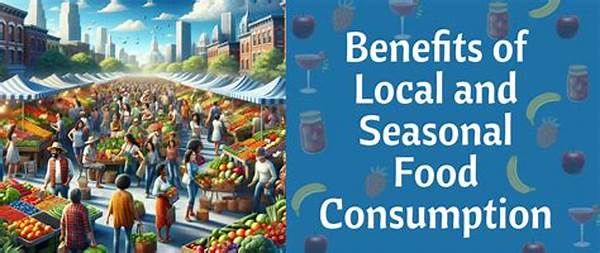Organic farming has taken the world by storm in recent years, turning heads with its promise of producing fresh, chemical-free food. But beyond the plate, there’s a whole world of advantages, especially for Mother Nature. From improving soil health to creating a haven for biodiversity, the environmental perks of organic farming are like a ripple that positively affects everything it touches. Curious how? Let’s dive into it.
Read Now : Nutrient-rich Local Food Choices
The Deep Down on Organic Farming Environmental Benefits
So, you’re wondering why everyone’s buzzing about organic farming environmental benefits? Well, here’s the scoop. First off, organic farming is super friendly to our planet. It’s all about using natural fertilizers like compost or manure and steering clear of nasty chemicals. This not only maintains the integrity of the soil but also ensures it’s packed with nutrients. Plus, crops grown on these farms tend to be healthier and more resilient to pests and diseases. Pretty cool, right?
Second, organic farming loves biodiversity! Say goodbye to monocultures—the farming style where one single crop is planted over massive stretches of land. Instead, organic farms embrace a mix of plants, which encourages all sorts of critters to set up shop. From bees and butterflies to birds, it’s a party for the local fauna. And the third ace up its sleeve? It’s a water conservation whiz. Since organic farms support healthy soil structure, they retain water better, resulting in less wastage and erosion. Ergo, healthier ecosystems and plenty more H2O for the rest of us. Now that’s what I call a win-win-win!
Why Organic Farming Brings Out Nature’s Rockstar
1. Soil’s Best Friend: Organic farming loves to hug mother earth, keeping soils rich and alive.
2. Wildlife’s BFF: It’s like throwing a wildlife party—biodiversity booms!
3. Water Whisperer: Less H2O waste; organic farming environmental benefits keep the aqua in reserve.
4. Chem-Free Zone: Nix the nasty chemicals, and the environment gives two thumbs up.
5. Eco-Champion: It’s comfy for our planet, promoting sustainable, environmentally friendly practices.
How Organic Farming Saves the Planet, One Crop at a Time
Organic farming might sound like all the rage, but it’s no fleeting trend. Its sustainable practices have rock-solid impacts on our environment. Tapping into the organic farming environmental benefits, you can see its magic lifesaving powers on earth. It not only helps the soil blossom with nutrients but dares to remove the bad chaps from the picture. There’s no need for synthetic fertilizers polluting our land. Instead, organic farming chooses natural ones, bringing more glow to the soils.
Furthermore, organic farming acts like the planet’s own doctor, healing it with every crop rotation. By letting nature take the lead, ecosystems stay stable, ensuring a vibrant balance. Even when it comes to water, organic farming is a real hero. It’s like having a sponge-like soil that drinks up all the goodness and saves water from being wasted. And, when we look around, there’s more wildlife jumping into the organic bandwagon because of all the cozy habitats organic agriculture provides.
Ten Awesome Perks of Organic Farming Environmental Benefits
1. Nature’s Pal: It’s like nature’s hug, keeping things green.
2. Pesticide-Free Universe: Kicking the chemicals to the curb.
3. Earth’s Water Saver: Saving up on H2O like a pro.
4. Biodiversity Bonanza: More critters, more fun!
Read Now : Regional Italian Culinary Expertise
5. Pollinator Paradise: Bees and butterflies thrive, and flowers bloom.
6. Carbon Capture Champ: Grabs carbon dioxide like a pro wrestler.
7. Healthy Soil Vibes: Enriches soils with every crop.
8. Pure Air: Reducing pollutants that mess with the air we breathe.
9. Resilient Crops: Stronger, healthier plants beating the bugs.
10. Feel-Good Farming: It’s like farming with a halo.
Let’s Dig Deeper into Organic Farming Environmental Benefits
Organic farming environmental benefits practically redefine how farming should groove with nature. Imagine crops swaying in the breeze, nourished by soils that are teeming with microbial life. Instead of robbing the land’s vitality, this method ensures that the earth constantly replenishes its resources, cycling nutrients that fuel the growth of vibrant plants. And while it’s working wonders on the ground, it’s nurturing a world above teeming with an orchestra of birdsong and fluttering butterflies.
Switch lanes to organic farming, and you find a meticulously curated ecosystem where pests are kept in check by the natural hierarchy of predators and prey. This means robust, healthy crops minus the artificial barriers. Rainfall doesn’t wash away this balance either, for organic farms beckon it to soak happily into the soil. Before you know it, there’s less runoff, fewer floods, and happier rivers downstream.
Bouncing Ideas: The Wow Factor of Organic Farming Environmental Benefits
Feeling the buzz yet? Organic farming environmental benefits spun stories leave you thinking, “Why isn’t everyone doing this?” The earth becomes your best buddy again when we stick to practices that prioritize rejuvenation. All this goodness backs cleaner air, richer soil, and livelier gardens and fields. It’s almost like being handed the Earth’s VIP pass to a healthier space.
But this isn’t just about looking at the present. The long game that organic farming plays is a future we can all root for. It bets on legacies that nurture habitats and embrace the wild and free spirit of nature. Plus, reveling in all the resources like water and air being less tainted? That’s a dream boat carrying us toward a greener tomorrow, stocked full of renewed hopes, resources, and smiles. Organic farming environmental benefits craft visions not just for today but for generations we can teach to care for this big blue planet.
In a nutshell, organic farming is like putting the power back in Mother Nature’s hands, letting her strut her stuff with grace and gumption. So why not stick to the earthy charm?



